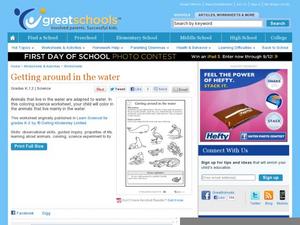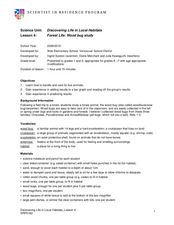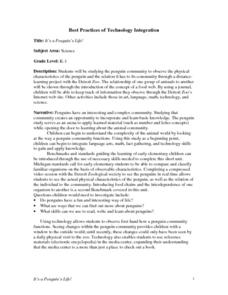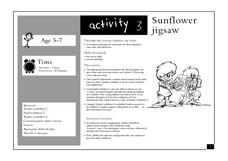Curated OER
Color the Sea Animals
In this coloring worksheet, students will look at a picture of 14 different types of animals. Then students will color the animals that live in the sea.
Curated OER
Getting Around in the Water
Young scientists who are learning about the variety of environments that animals live in use a activity in order to choose animals that live, primarily, in water environments. There are eight pictures on the activity, and learners must...
PBS
The Caterpillar or Larva
The larval stage of the butterfly life cycle is quite exciting. Start a discussion about the specially designed body parts unique to caterpillars. After examining images of caterpillars, learners use plastic soda bottles, string, and...
Curated OER
Forest Life- Wood Bug Study
Examine wood bugs and their habitat. Learners gather wood bugs and examine their bodies. Then discuss their body parts and how they help them survive. They also predict where they think wood bugs live to then graph the class results.
Montana Natural History Center
Studying Grassland Ecosystems
At first glance, grassland ecosystems might seem dull and uninteresting, but once you start to explore it's amazing the things you'll find! Through this series of engaging lessons, activities, and experiments, elementary students examine...
Curated OER
Penguins Around the World
Students investigate penguins. In this Science lesson, students compare and contrast penguins to flying birds. Students use a Venn diagram to illustrate the differences and similarities of penguins and flying birds.
Cornell Lab of Ornithology
Amazing Birds
What's so amazing about birds? Find out just how amazing birds are with a physics of animal behavior unit created by Cornell Lab of Ornithology. Have learners explore and tap into their observational skills and notice how birds fly, what...
US Mint
Desert Dwellers
What can a quarter possibly teach young learners about desert ecosystems? More than you might think. After displaying and discussing the included picture of the Arizona state quarter, the class participates in a series of...
Curated OER
Urban Life: What Lives in Our Schoolyard?
Students research living organisms by exploring their school grounds. In this microscopic observation lesson, students gather materials, insects, and objects from their playground and schoolyard and bring them into class. Students...
Kindergarten Kindergarten
Living and Non-Living Sort
What do an ice cream cone, bicycle, and alarm clock all have in common? That's exactly what young scientists will find out as sort these pictures and learn about the differences between living and non-living things.
Curated OER
The Dance of the Butterfly
Learners explore butterfly life cycles and movement. In this integrated fine arts and biology life cycle lesson, students listen to the book The Very Hungry Caterpillar by Eric Carle and identify the related life cycle stages....
Curated OER
PLANT LIFE CYCLES
Student learns about the life cycle of plants by watching a time-lapse video. This activity provides young scholars with further evidence that all living things grow and change as they progress through their life cycle. Student conducts...
Curated OER
Where Are the Dinosaurs?
Students investigate dinosaurs. In this life science instructional activity, students watch video clips on the website http://dsc.discovery.com/convergence/dinos/video/video.html and discuss the characteristics of the dinosaurs. Students...
Curated OER
Tamar Burris
Students explore genetics. In this life cycle lesson, students consider the meaning of "genes" and "heredity" as they watch a video about the topics. Students then research their own genetic make-up as they interview family members....
Curated OER
Marine Animal and Plant Adaptations
Students examine nature by creating their own animals. In this animal adaptation instructional activity, students define scientific vocabulary terms dealing with adaptation such as sea stars, sea cucumbers and exoskeleton. Students...
Curated OER
What Ocean Animals Do Worksheet
In this ocean animals activity, students look at six pictures of ocean animals and then draw a line from each ocean animal to the description that matches it best.
Curated OER
It's a Penguin's Life!
Learners will be studying the penguin community to observe the physical characteristics of the penguin and the relation it has to its community through a distance learning project with the Detroit Zoo.
Curated OER
The Classification of the Kingdoms of Life
Students can learn about the evolution of science by discussing the classification of living things.
Curated OER
Pond Life
Students explore pond ecosystems. In this living environment lesson, students observe the local pond and identify the living things they find by drawing pictures. Students observe organisms that were found in the pond by using a...
Alabama Learning Exchange
My Book of Seasons
Learners research the assigned Internet sites to explore facts about the four seasons. They design and create a book about the relationship between the four seasons and everyday life. They work on a teacher created PowerPoint template to...
Curated OER
Birth, Growth, And Development
Students explain that all living things have a life cycle that includes being born, developing into an adult, reproducing, and eventually dying.
Curated OER
Birth, Growth and Development
Students discover that all living things have a life cycle in which they are born, reproduce and die. In groups, they examine and analyze the changes that happen during the lifespan of a human. To end the lesson plan, they discuss how...
Curated OER
Sunflower Jigsaw
Students recognize and name the main parts of a flower. In this life science lesson, the teacher leads a discussion about the parts of a plant, then students color and cut out the parts of a planet, then glue the parts together...
Curated OER
Seed Sorting
Students examine and sort seeds. In this life science lesson, students make general observations of a tub of seeds, then develop sorting criteria for sorting the deeds. Lesson includes extension activities.






















